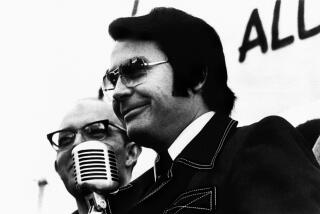The Staying Power of Secrecy
- Share via
“Culture of secrecy” may not be a phrase coined by Bush Administration Secretary of Energy James Watkins, but Watkins gave it new currency when he declared his determination to change this culture as it affected the part of government he was responsible for. Cultures, however, have great staying power, and he made little headway.
Thus, in April, 1990, Washington’s Gov. Booth Gardner wrote Watkins warning that unaddressed safety problems at the Hanford nuclear reservation were proving “deadly to the credibility of the Department of Energy.” Gardner credited Watkins with good intentions but insisted that “your call for a cultural change emphasizing safety and candid behavior in the Department of Energy has not reached all levels of the agency at Hanford.” That was putting it diplomatically.
Will Clinton Administration Secretary of Energy Hazel O’Leary prove more successful than Watkins? She has made an unprecedented move by establishing a telephone hot line--(800) 493-2998--for persons who believe they were subjects in secret nuclear experiments conducted by the U.S. government on American citizens from the 1940s through the 1960s.
News of these experiments, whispered of in the past but made effectively public by the Albuquerque Tribune, has deeply shocked the nation. Rabbi Abraham Cooper of the Simon Wiesenthal Center has suggested that they may constitute prosecutable crimes against humanity as defined by the Nuremberg War Crimes Tribunal.
The Times has already urged O’Leary to seek full disclosure of all such actions at the earliest possible date, and we are gratified that, going beyond disclosure, she has urged compensation for victims.
The broader change, however, is one that goes beyond the conduct of the Department of Energy toward the victims of sickening past experimentation. The mantra “national security” has been spoken to justify much in American life that had little to do with national security, much that entailed and continues to entail dire cost to individual Americans.
The candor and dispatch that O’Leary brings to bear on post-Cold War nuclear cleanup will be, in the end, the larger test for her assault on the culture of secrecy: Hanford, yes, and Savannah River and a list of sites about which, to this hour, the American people have been told far too little. A consensus has formed quickly around the need for full disclosure of the scandalous nuclear medical experiments. Consensus will form more slowly around the need for comparable candor elsewhere. But O’Leary has shown that she can do it. If she can do it again and again, the Cold War may finally be over.
More to Read
Sign up for Essential California
The most important California stories and recommendations in your inbox every morning.
You may occasionally receive promotional content from the Los Angeles Times.













